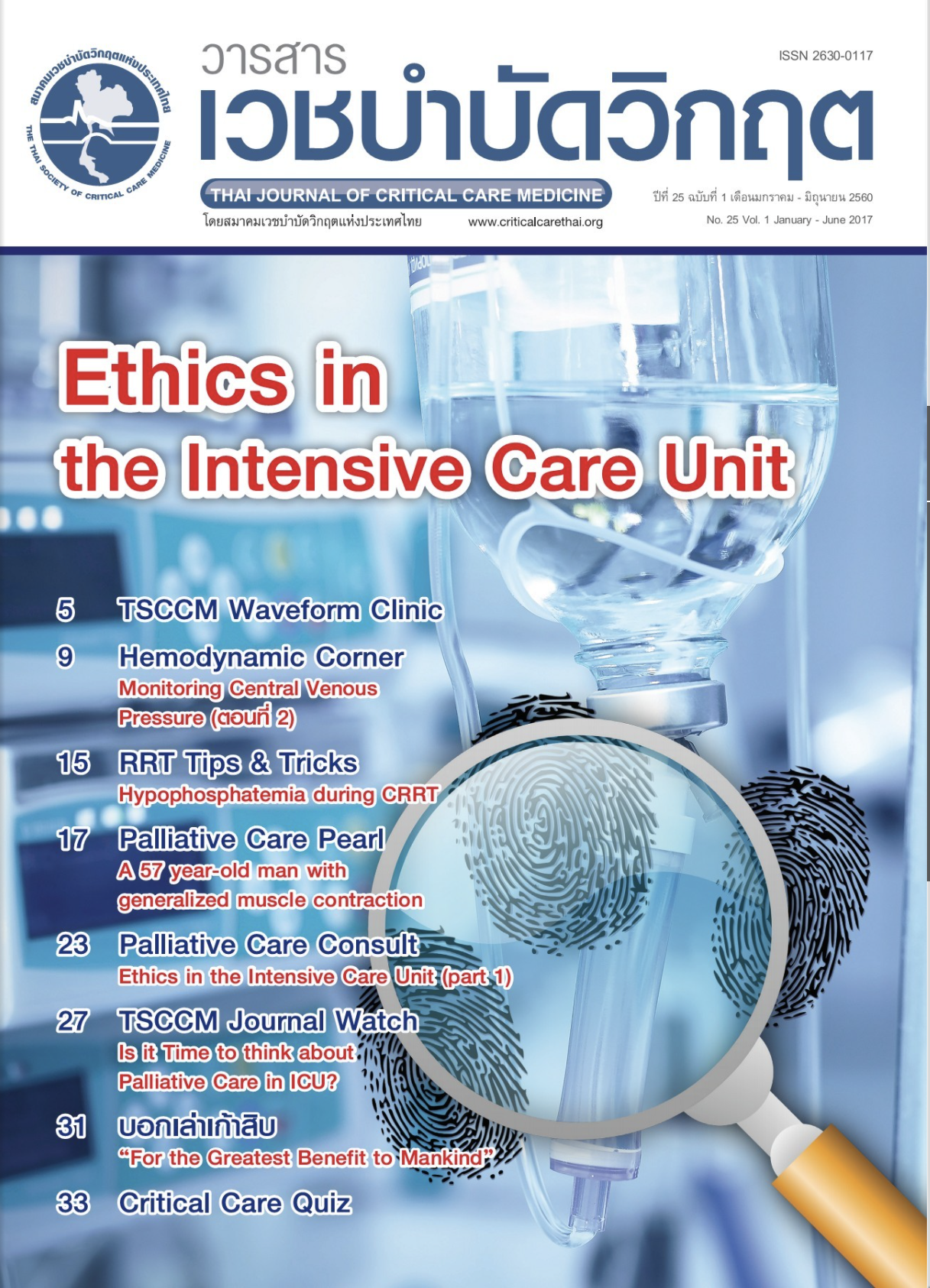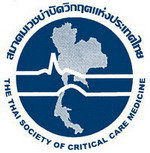Ethics in the Intensive Care Unit (part 1/2)
Abstract
ไอซียู คือ สถานที่ที่ผู้ป่วยมักจะเสียชีวิตมากที่สุด ดังนั้น ในสภาวการณ์ หรือสภาพในไอซียูย่อมทำให้ เกิดความขัดแย้งระหว่างผู้ป่วย ญาติ และบุคลากรทางการแพทย์ได้ง่าย ดังนั้น ทีมแพทย์ไอซียูจึงควรมีความชำนาญในการตัดสินใจด้านจริยธรรม และความขัดแย้งที่เกิดขึ้นส่วนใหญ่ คือ เรื่องพฤติกรรม เช่น การใช้คำพูดที่สบประมาท หรือการสื่อสารที่ไม่ดีระหว่างแพทย์ และพยาบาล การดูแลในระยะท้ายที่ขาดความเคารพในตัวตนของผู้ป่วย (patient autonomy) ความขัดแย้งด้านจริยธรรมโดยส่วนใหญ่จะสัมพันธ์กับความกดดันจากงาน และ Burnt-out syndrome ของบุคลากรทางการแพทย์ และอาจจะส่งผลร้ายต่อคุณภาพของการดูแลรักษา การที่จะพัฒนาคุณภาพของการดูแลรักษานั้นต้องมีการจัดการที่ดีในด้านจริยธรรมอย่างเหมาะสมเพราะเป็นสิ่งที่สำคัญ และสร้างความเข้าใจในสิ่งเหล่านี้หมอไอซียูจำเป็นต้องมีความไวต่อความขัดแย้งด้านพฤติกรรม และสามารถที่จะร่วมตัดสินใจในการดูแลวาระท้ายของชีวิต ในขณะเดียวกันองค์กร และการบริหารจัดการก็ควรที่จะพัฒนากระบวนการต่าง ๆ เพื่อที่จะค้นหา และแก้ไขความขัดแย้งด้านจริยธรรมด้วย
Downloads
References
Jae Young M, Ju-Ock K. REVIEW : Ethics in the Intensive Care Unit. Tuber Respir Dis 2015; 78: 175-179.
Aulisio MP, Arnold RM, Youngner SJ. Ethics consultation from theory to practice. Baltimore: The Johns Hopkins University Press; 2003.
Angus DC, Barnato AE, Linde-Zwirble WT; Weissfeld LA, Watson RS, Ricker T, et al. Use of intensive care at the end of life in the United States: and epidemiologic study. Crit Care Med 2004; 32: 638-43.
Azoulay E, Timist JF; Sprung CL, Soares M, Rusinova K, Lafabrie A, et al. Prevalence and factors of intensive care unit conflicts; the conflicus study. Am J Respir Crit Care Med 2009; 180: 853-60.
Hamric AB, Blackhall LJ. Nurse-physician perspectives on the care of dying patients in intensive care units: collaboration, moral distress, and ethic climate, Crit Care Med 2007; 35: 422-9.
Pochard F, Darmon M, Fassier T, Bollaert PE, Cheval C, Coloigner M, et al. Symptoms of anxiety and depression in family members of intensive care unit patients before discharge or death. A prospective multicenter study. J Crit Care 2005; 20: 90-6.
Romano ME, Wahlander SB, Lang BH, Li G, Prager KM. Manadatory e thics consultation policy, Mayo Clin Proc 2009; 84: 581-5.
Park DW, Moon JY, Ku EY, Kim SJ, Koo YM, Kim OJ, et al. Ethical issues recognized by critical care nurses in the intensive care units of a tertiary hospital during two separate periods. J Korean Med Sci 2005; 30 : 495-501.
Swetz KM, Crowley ME, Hook C, Mueller PS. Report of 255 clinical ethics consultations and review of the literature Mayo Clin Proc 2007; 82: 686-91.
Tapper EB, Vercler CJ, Cruze D, Sexson W, Ethics consultation at a large ur ban public teaching hospital, Mayo Clin Proc 2010; 58: 433-8.
Saxton R, Hines T, Enriquez M. The negative impact of nurse-physician disruptive behavior on patient safety: a review of the literature. J Patient Saf 2009; 5: 180-3.
Kang JH, Kim CW. Evaluating applicability of Maslach burnout Inventory among university hospitals nurses. Korean J Adult Nurs 2012; 24: 31-7.
Poghosyan L, Aiken LH, Sloane DM, Factor structure of the Maslach burnout inventory: and analysis of data from large scale cross-sectional surveys of nurses from eight countries. Int J Nurs Stud 2009; 4 6: 894-902.
Yun YH, Kwon YC, Lee WJ, Jung KH, Do YR, et al. Experiences and attitudes of patients with terminal cancer and their family caregivers toward the disclosure of terminal illness. J Clin Oncol 2010; 28: 1950 -7.
Yun YH, Kwak M, Park SM, Kim S, Choi JS< Lim Hy, et al. Chemotherapy use and associated factors among cancer patients near the end of life. Oncology 2007: 164-71.
Yun YH, Lee MK, Kim Sy, Lee WJ, Jung KH, Do YR, et al. Impact of awareness of terminal illness and use of palliative care or intensive care unit on the survival of terminally ill patients with cancer: prospective cohort study, J Clin Oncol 2011; 29: 248-80.
Lee JK, Keam B, An AR, Kim TM, Lee SH, Kim DW, et al. Surrogate decision-making in Korean Patients with advanced cancer: a longitudinal study. Support Care Cancer 2013; 21: 183-90.
Piers RD, Azoulay C, Ricou B, Dekeyser Ganz F, Decruyenaerd J, Max A, et al. Perceptions of appropriateness of care among European and Israeli intensive care unit nurses and physicians JAMA 2011; 306: 269-703.
Hwang KE, Seol CH, Hwang YR, Jo HG, Pard SH, Yoon KH, et al. The prognosis of patients with lung cancer admitted to the medical intensive care unit, Asia Pac J Clin Oncol 2013 Dec 2 [Epub]. http://dx.doi.org/10.111/ajoc.12157.





